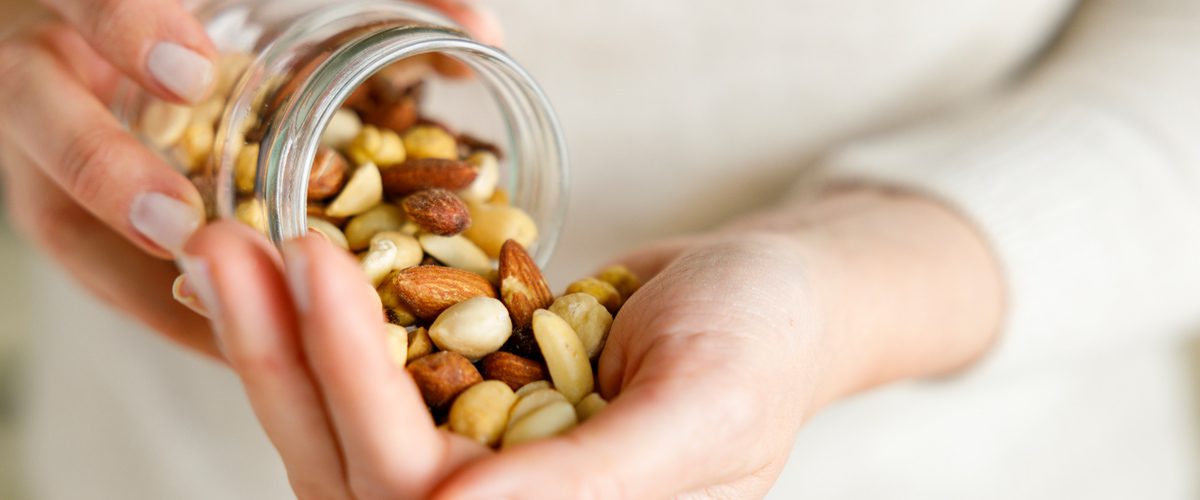How To Make Snacking a Healthy Habit
Is snacking good for you? A nutritionist shares how grazing may lead to healthier eating.

For some people, snacking may seem like a bad habit associated with junk food and excess calories. But snacking throughout the day can actually be part of a healthy approach to eating — if done mindfully. While there’s no one right way to eat, healthy snacking can help you sustain energy during the day, and also prevent you from overeating during meals, says Rachael Pollak, a clinical nutritionist at NewYork-Presbyterian/Columbia University Irving Medical Center.
Rather than adhering to strict rules of do’s and don’ts, Pollak says it’s about approaching food with moderation in mind. “Make sure you’re not ever limiting what you’re giving yourself access to,” she advises. “Every person is different; every person’s needs are different. I emphasize to people that they should listen to their own body.”
Pollak shared with Health Matters how she approaches snacking, plus her favorite go-to foods that keep her going during her busiest days.
Incorporate Snacking Into Your Routine
Planning weekly meals may be common practice, but adding snack planning into the mix can also help establish healthy eating habits. “I like to encourage people to incorporate more snacking into their day-to-day so they don’t get to their meals feeling ravenous,” says Pollak. “They’ll find that they’ll be less stressed and hungry at mealtimes and be able to make better choices because of that.”
Pollak says she generally eats four to five snacks a day in addition to her main meals, which are lunch and dinner. “I would call my breakfast a snack. Then I’ll have another small snack an hour or two later, and then it’s lunchtime.” If Pollak is buying her lunch at work, she’ll purchase an additional healthy snack to eat later “when I’m feeling munchy,” she says. “We’ve all been in that hangry stage where we’re just like, ‘I need to eat everything that’s in front of me right now,’ and that’s what we’re trying to avoid.”
Pick Snacks That Will Keep You Full
While a bag of chips may seem like an easy go-to snack when your stomach is growling, they likely won’t satisfy you the way you think they might. Instead, choose foods that have protein, healthy fat, and carbohydrates. Nuts are an easy grab-and-go option, but you can also combine two items, such as an apple with peanut butter or grapes and cheese. “Something with carbohydrates will help immediately satisfy your hunger,” says Pollak. “And then protein and fat will help keep you fuller for longer and give some good sustainable energy for a couple of hours.” Pollak’s favorite snack is yogurt with granola: “It’s just a comfort food to me,” she says. “Yogurt hits all of those nutrition boxes, and I like adding granola for the added texture.”
Rachael's Favorite Snack Choices
- Yogurt with granola
- String cheese
- Fruit
- Vegetables and dip
- Cottage cheese
- Protein bar
- Nuts
Make Sure You Have Options
For those working in an office, sweets can be plentiful and at your fingertips — especially around certain holidays. While there’s no shame in having a cookie, sugar-filled treats won’t satisfy your nutritional needs. “I always like to tell people to have a plethora of healthy snacks around you at all times,” says Pollak. “So when I’m out shopping for the week, I look for fruits and vegetables, and foods that are higher in protein, such as cheeses, cottage cheese, yogurts. That way, when I’m hungry and I’m ready to have a snack, it’s not just that cookie or cake or candy that’s around. I can still take a piece of candy, but complement that with something else that will satiate me.”
Maintain a Healthy Balance
“Everything in moderation” is an adage that applies to a healthy lifestyle, including positive eating habits. In the context of eating, it means balancing your food choices so that you give your body the energy it needs while also making yourself feel good. Pollak says that people should allow themselves to have foods that seem like indulgences, as long as they balance them with foods that provide nutrients that the others lack.
“For example, I’m a big chocolate person,” says Pollak. “I don’t limit myself in how much chocolate I could eat, but I do make an effort to also have other foods that are going to help me feel satisfied so I’m not just eating chocolate all day long. I don’t let chocolate replace my meal.”
Ultimately, the goal is to be more mindful of what your body needs during the day. “I feel there’s a lot of outside influence in our world in terms of telling people what they should and shouldn’t be eating and when they should and shouldn’t be eating it,” says Pollak. “You might need more snacks throughout the day than the person next to you or you might need fewer. Try your best not to compare yourself to others or to what they’re doing. That’s very important in maintaining this balance.”
Additional Resources
Get more mindful eating tips from a NewYork-Presbyterian nutrition expert on Everyday Health.

